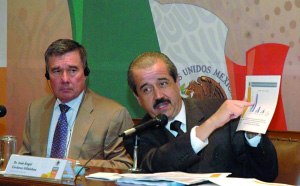
|  |  |  Health & Beauty Health & Beauty  
Mexico, U.S. Reject Drug Legalization
 The News The News
go to original
February 24, 2010


| | Córdova says narcotics are illegal because they are dangerous. (The News) |  |
Washington, D.C. – Mexican Health Secretary José Ángel Córdova Villalobos declared on Feb. 23 that the Mexican government is against the legalization of drugs.

Córdova Villalobos’ point of view coincides with the vision of American antidrug “czar” Gil Kerlikowske, who believes keeping drugs illegal is the the best way to reduce drug use.

“I would like to make it very clear that in Mexico, there is a consensus in favor of the penalization of the cultivation, transporation, possession, dealing in and use of substances recognized as dangerous by the international community,” Córdova declared.

“We are convinced that the legalization of drug use is not only dangerous and improbable; it is also a pragmatic mistake... Drugs aren’t dangerous because they are illegal, they are illegal because they are dangerous,” Córdova said.

Kerlikowske, director of the White House’s National Bureau of Controlled Drugs, said the legalization of drugs is not an issue currently discussed by President Barack Obama and his administration.

“And the reasons for that are numerous: for instance, there is no evidence that the legalization of drugs can reduce violence or benefit the economy,” Kerlikowske explained.

Córdova and Kerlikowske inaugurated the 8th bilateral working session on the reduction of drug use in Mexico and the United States, seeking to exchange information on existing experiences in order to reduce the demand for drugs in both countries.

Although the legalization of drugs were not to be officially discussed during the working session, Córdova referred to the issue in his opening speech and declared there is a consensus on penalization for drug use.

When a journalist said several public figures in Mexico supported the legalization of drugs, Córdova replied: “I don’t know if I expressed myself correctly; the policy of the Mexican government goes against legalization. We are not talking of a consensus, but of a public policy.”

The Health Secretary further explained that the position of the Mexican government is “founded on existing scientific researches showing that the use of legal addictive substances tends to encourage the use of illicit substances.”

According to official statistics from Mexico and the United States, 20 to 25 million people are addicted to illegal drugs in the United States. By contrast, Mexico counts 500,000 drug addicts.

In the United States, only 10% of the more than 20 million diagnosed with drug problems receive medical treatment for their addiction.

The Under-Secretary of the National Bureau of Controlled Drugs, Thomas McLellan, explained that part of the problem in the United States is due to the fact that the medical system, counting more than 12,000 rehabilitation centers in the country, is “unequal”.

McLellan also said that 68 million Americans still consume drugs and alcohol in an excessive way, even though they are not counted as addicts.

U.S. Health Secretary Kathleen Sebelius emphasized the importance of bilateral cooperation on matters of public health, including the H1N1 epidemic.

“Health issues do not stop at the border; Mexico and the United States have a lot to learn from one another,” Sebelius said.

On Wednesday, Margarita Zavala, the wife of Felipe Calderón, will participate in the Washington working session to discuss current programs for the reduction of drug use in Mexico. Public officials and experts will be present to examine the issue. |

 |
|  |



